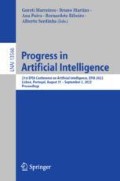Abstract
In this paper we present DeMaxSAT, a memetic algorithm for solving the non-partial MaxSAT problem. It combines the evolutionary algorithm of Differential Evolution with GSAT and RandomWalk, two MaxSAT-specific local search heuristics. An implementation of the algorithm has been used to solve the benchmarks for non-partial MaxSAT included in the MaxSAT Evaluation 2021. The performance of DeMaxSAT has reached results that are comparable, both in computing time and quality of the solutions, to the best solvers presented in MaxSAT Evaluation 2021, reaching the state of the art for non-partial problems.
Access this chapter
Tax calculation will be finalised at checkout
Purchases are for personal use only
Notes
- 1.
The code of DeMaxSAT is available at [1].
References
DeMaxSAT Solver (2021). https://github.com/Manuframil/DEMaxSatSolver
Ali, H.M., Mitchell, D., Lee, D.C.: MAX-SAT problem using evolutionary algorithms. In: 2014 IEEE Symposium on Swarm Intelligence, pp. 1–8 (2014)
Bacchus, F., Järvisalo, M., Berg, J., Martins, R.: MaxSAT evaluation (2021). https://maxsat-evaluations.github.io/2021/
Berg, J., Demirovic, E., Stuckey, P.: Loandra in the 2020 MaxSAT evaluation (2020). https://helda.helsinki.fi/bitstream/handle/10138/333649/mse21proc.pdf
Bhattacharjee, A., Chauhan, P.: Solving the SAT problem using genetic algorithm. Adv. Sci. Tech. Eng. Syst. J. 2(4), 115–120 (2017)
Boughaci, D., Benhamou, B., Drias, H.: Scatter search and genetic algorithms for MAX-SAT problems. J. Math. Model Algor. 7, 101–124 (2008). https://doi.org/10.1007/s10852-008-9077-x
Chen, W., Whitley, D., Tinós, R., Chicano, F.: Tunneling between plateaus: improving on a state-of-the-art MAXSAT solver using partition crossover. In: Proceedings of the Genetic and Evolutionary Computation Conference, GECCO 2018, Kyoto, Japan, 15–19 July (2018)
Das, S., Mullick, S., Suganthan, P.: Recent advances in differential evolution - an updated survey. Swarm Evol. Comput. 27, 1–30 (2016)
Djenouri, Y., Habbas, Z., Djenouri, D., Fournier-Viger, P.: Bee swarm optimization for solving the MAXSAT problem using prior knowledge. Soft. Comput. 23(9), 3095–3112 (2017). https://doi.org/10.1007/s00500-017-2956-1
Doerr, B., Zheng, W.: Working principles of binary differential evolution. Theoret. Comput. Sci. 801, 110–142 (2020)
Doush, I.A., Quran, A.L., Al-Betar, M.A., Awadallah, M.A.: MAX-SAT problem using hybrid harmony search algorithm. J. Intell. Syst. 27(4), 643–658 (2018)
Fu, H., Xu, Y., Wu, G., Jia, H., Zhang, W., Hu, R.: An improved adaptive genetic algorithm for solving 3-SAT problems based on effective restart and greedy strategy. Int. J. Comput. Intell. Syst. 11(1), 402–413 (2018)
Joshi, S., Kumar, P., Rao, S., Martins, R.: Open-WBO-Inc in MaxSAT evaluation 2020 (2020). https://helda.helsinki.fi/bitstream/handle/10138/333649/mse21proc.pdf
Lardeux, F., Saubion, F., Hao, J.K.: GASAT: a genetic local search algorithm for the satisfiability problem. Evol. Comput. 14, 223–53 (2006)
Lei, Z., et al.: SATLike-c: solver description (2021). https://helda.helsinki.fi/bitstream/handle/10138/333649/mse21proc.pdf
Lovíšková, J.: Solving the 3-SAT problem using genetic algorithms. In: INES 2015 - IEEE 19th International Conference on Intelligent Engineering Systems, pp. 207–212 (2015)
Menai, M.E., Batouche, M.: efficient initial solution to extremal optimization algorithm for weighted MAXSAT problem. In: Chung, P.W.H., Hinde, C., Ali, M. (eds.) IEA/AIE 2003. LNCS (LNAI), vol. 2718, pp. 592–603. Springer, Heidelberg (2003). https://doi.org/10.1007/3-540-45034-3_60
Nadel, A.: Tt-Open-WBO-Inc-21: an anytime MaxSAT solver entering MSE 2021 (2020). https://helda.helsinki.fi/bitstream/handle/10138/333649/mse21proc.pdf
Neri, F., Cotta, C.: Memetic algorithms and memetic computing optimization: a literature review. Swarm Evol. Comput. 2, 1–14 (2012)
Reisch, J., Großmann, P.: Stable Resolving (2020). https://helda.helsinki.fi/bitstream/handle/10138/333649/mse21proc.pdf
Selman, B., Kautz, H.A.: Domain-independent extensions to GSAT: solving large structured satisfiability problems. In: Proccedings of the IJCAI-93, pp. 290–295 (1993)
Selman, B., Levesque, H., Mitchell, D.: A new method for solving hard satisfiability problems. In: Proceedings of the AAAI Conference, pp. 440–446. AAAI Press (1992)
Storn, R., Price, K.: Differential evolution - a simple and efficient heuristic for global optimization over continuous spaces. J. Global Optim. 11, 341–359 (1997)
Acknowledgments
Partially funded by the Xunta de Galicia and the European Union (European Regional Development Fund - Galicia 2014–2020 Program), with grants CITIC (ED431G 2019/01) and GPC ED431B 2022/33, and by the Spanish Ministry of Science and Innovation (grant PID2020-116201GB-I00).
Author information
Authors and Affiliations
Corresponding author
Editor information
Editors and Affiliations
Rights and permissions
Copyright information
© 2022 The Author(s), under exclusive license to Springer Nature Switzerland AG
About this paper
Cite this paper
Framil, M., Cabalar, P., Santos, J. (2022). A MaxSAT Solver Based on Differential Evolution (Preliminary Report). In: Marreiros, G., Martins, B., Paiva, A., Ribeiro, B., Sardinha, A. (eds) Progress in Artificial Intelligence. EPIA 2022. Lecture Notes in Computer Science(), vol 13566. Springer, Cham. https://doi.org/10.1007/978-3-031-16474-3_55
Download citation
DOI: https://doi.org/10.1007/978-3-031-16474-3_55
Published:
Publisher Name: Springer, Cham
Print ISBN: 978-3-031-16473-6
Online ISBN: 978-3-031-16474-3
eBook Packages: Computer ScienceComputer Science (R0)

